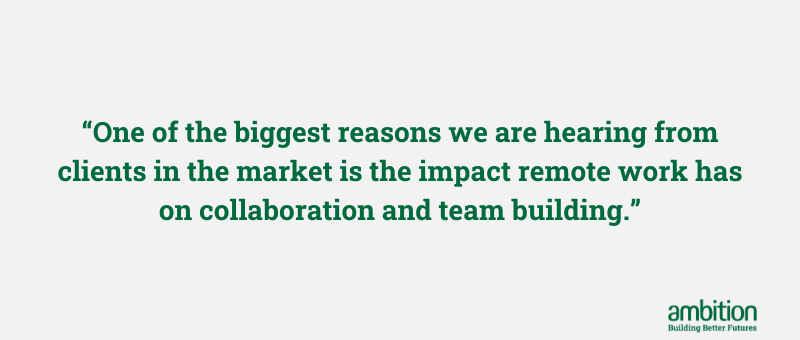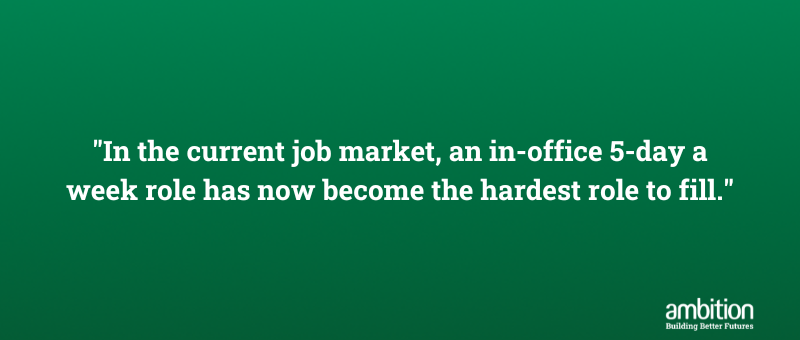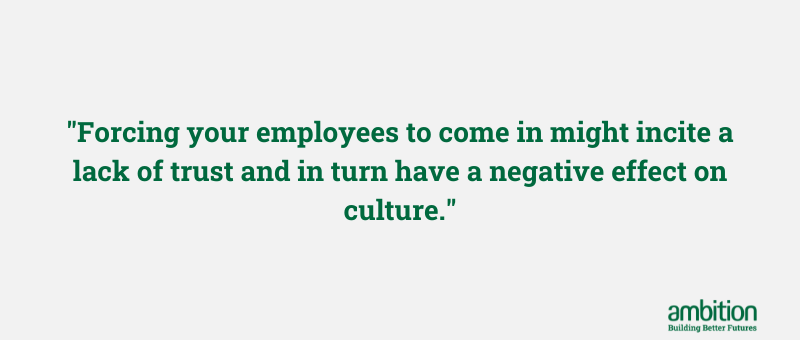Career insights with Ambition podcast
The podcast that dives deep into the defining moments of influential business leaders across technology, accounting and finance.

The podcast that dives deep into the defining moments of influential business leaders across technology, accounting and finance.

The podcast that dives deep into the defining moments of influential business leaders across technology, accounting and finance.

The podcast that dives deep into the defining moments of influential business leaders across technology, accounting and finance.



In the past few years, we have seen the shift towards remote work transform how we view office environments. Whilst remote work has been invaluable through lockdowns, we are seeing many companies reassess their remote work policies and considering a return to the traditional 5-day office work week. This transition, however, is not without its challenges and benefits. For companies navigating these waters, understanding the implications of such a mandate is crucial.
Remote work pushed its way to the forefront in 2020 when organisations had to rethink the world of work. With lockdowns meaning no-one could go to the office, we had to think of another solution. Since then, it has gone from strength to strength with candidates in the current job market demanding it as an essential requirement when job searching.
Push forward to 2024 and we are seeing many companies rethink their remote policies, but why is this?
One of the biggest reasons we are hearing from clients in the market is the impact remote work has on collaboration and team building.
In-person interactions often lead to more spontaneous brainstorming sessions, quicker decision-making, and stronger relationship building. Face-to-face meetings can also help in reducing misunderstandings and miscommunications that sometimes occur in virtual settings. This can be especially true for new starters and less experienced members of the workforce who are learning the nuances of working in the professional world.

Your company culture is much more than presenteeism, it encompasses the values, mission, behaviours and ways of working that make your company and everyone in it a community. However, daily face-to-face interactions can help in reinforcing these aspects by:
Building relationships
Strengthening a sense of belonging among team members
Reinforcing shared values and behaviours
There are mixed reviews on the impact of remote working on productivity. Some would stand by the fact that working from home enhances their productivity, however, it seems to be the main reason why companies are looking to bring workers back into the office.
There is no doubt that office environments can create a structured atmosphere that fosters accountability. Being physically present in the office can help employees stay focused and adhere to schedules. Managers also benefit from having a direct view of team performance and can provide immediate support as needed.
In the current job market, an in-office 5-day-a-week role has now become the hardest role to fill. The talent pool for these roles is much smaller, and in a competitive market that means they take much longer to fill.
Whether you are looking at mandating a full 5 days or maybe even 2 or 3 set days a week, there are considerations that may impact your talent strategy, budgets and culture.
Many employees have come to value the work-life balance that remote work offers, including the ability to manage personal responsibilities like family life, more effectively. Removing some of that flexibility by implementing a rigid office schedule can look like a lack of trust in the employee, and lead to a decline in employee morale.
The opportunity to work from home allowed many people to reconsider where they lived for better quality of life. Many candidates made the move out of the main cities to suburbs that are one, two or even more hours away. By mandating office days these members of the workforce may have to reconsider their home locations or spend hours commuting each day. Longer commutes are often linked to higher stress levels and decreased overall health.

In the current job market, the flexibility of remote work is a significant factor in attracting and retaining top talent. Many candidates who are searching for new roles see it as an essential requirement. There are many groups of potential workers that could not consider a role without flexible work options, due to location or personal responsibilities.
Companies who mandate office days will initially reduce their talent pools and, therefore find it challenging to compete with organisations offering more adaptable work options.
Maintaining a fully operational office comes with costs, including:
Utilities
Office supplies, furniture and equipment
Maintenance and cleaning services
Security and access control
By requiring employees to return to the office, businesses may face increased expenses that may have been reduced or eliminated during remote work periods.
Before mandating office days, assess your company culture and operational needs. Understanding what you need and why, will help you to communicate effectively to your current and potential workforce.
Consider whether a full-time office presence aligns with your business goals and if it supports or hinders your company culture.
For most companies, moving to a remote model meant taking face-to-face meetings, and conducting the exact same thing online. Whilst this can work for some meetings, assessing the purpose and goals of this style of communication could show more effective ways to achieve the same goal.
For example – could that 'all company update Zoom meeting' be a video that is uploaded to your communication channel of choice, for employees to watch at a convenient time for them?
Co-Founder of WordPress and CEO of Automatic Matt Mullenweg explains this concept in his podcast series 'The Distributed' - an in-depth conversation about the future of work, with the companies and leaders driving it. To listen click the link - Podcast: Distributed, with Matt Mullenweg – Distributed.blog
Open a dialogue with your employees to understand their preferences and concerns regarding office attendance. Gathering feedback can provide valuable insights into how such a change might affect their productivity and job satisfaction. Transparent communication helps in addressing concerns and building trust with your employees.

As we heard earlier, culture and team building can benefit greatly from in-person interactions, but before we jump to mandated days in the office, we need to ask what else are we doing to nurture our culture.
Culture is the behaviours and values that are ingrained in your business, that make your employees feel a sense of belonging. Forcing your employees to come in might insight a lack of trust and in turn have a negative effect on culture.
Maybe an alternative solution is set team-building days throughout the year where the focus is on building relationships, problem solving and collaboration.
If you decide to enforce a 5-day office work week, closely monitor its impact on employee performance, satisfaction, and overall business outcomes. Be prepared to adapt your policies based on feedback and evolving circumstances to ensure that both your employees and your business are thriving.
Mandating a 5-day office workweek presents advantages and challenges. By carefully considering your company’s unique needs and engaging with your employees, you can develop a working model that supports both organisational success and employee well-being.
The hybrid work model, which seems to be favoured by most companies currently, might offer a balanced solution. Allowing employees to split their time between the office and remote work can combine the benefits of in-person collaboration with the flexibility that many workers desire.
At Ambition, we are committed to helping businesses make informed decisions that align with their goals and values. If you need guidance on navigating work policy changes or attracting top talent in this evolving job market, we’re here to help. Contact our team here.
Recruitment 2024: WFH debates and the pursuit of · Ambition Australia
False flexibility · Ambition Australia
Scenario planning: why your team should have a · Ambition Australia
Article written by Gemma Crolla, Digital Marketing Manager, Ambition Group Australia
Article edited by Melanie Brown, Marketing Executive, Ambition Group Australia